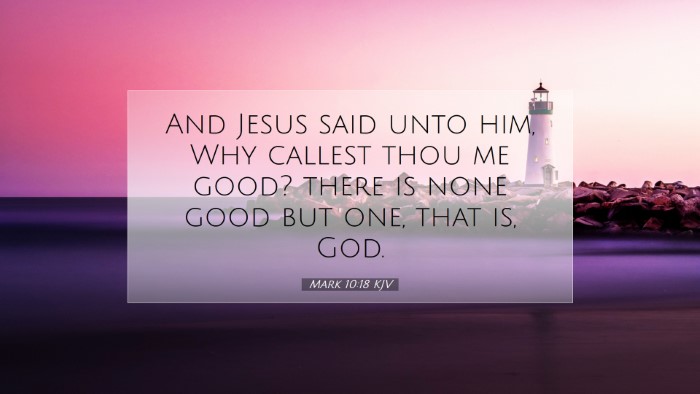Commentary on Mark 10:18
Mark 10:18 states: "And Jesus said unto him, Why callest thou me good? there is none good but one, that is, God."
Introduction
This verse is part of a larger narrative where Jesus encounters a rich young ruler who seeks eternal life. The response of Jesus to the young man’s address is profound, addressing not merely the ethics of goodness, but also the identity and nature of who He is.
Theological Insights
-
Recognition of Goodness:
Jesus begins by questioning the young man’s use of the term "good." This immediately sets the stage for a deeper exploration of what true goodness is. Matthew Henry emphasizes that Jesus delineates a distinction between human and divine goodness. Only God possesses inherent goodness, while humanity can only reflect it through grace.
-
Christ's Humility:
Recognizing that His goodness is derived from His divine nature, Jesus demonstrates humility here. Albert Barnes notes that Jesus is not denying His goodness but rather redirecting the focus to the nature of God’s goodness and the need for divine revelation in understanding it.
-
The Nature of God:
The declaration that only God is good has vast implications. Adam Clarke highlights that this touches upon the nature of God’s character—He is the ultimate standard of morality and goodness. In acknowledging this, one must consider the implications of God’s goodness in contrast to human frailty.
Practical Applications
-
Reflection on Our Ethical Standards:
This passage encourages believers to reflect on their understanding of goodness. It is vital to consider if ethical standards are measured against cultural norms or the divine nature of God. Matthew Henry applies this by urging individuals to seek alignment with God’s goodness as the basis for moral living.
-
Understanding Christ’s Role:
The question posed by Jesus serves as a launching point for deeper discipleship. One must grasp that calling Jesus "good" requires accepting His divine authority and the reality of salvation through Him. This aligns with Barnes’ commentary, which stresses the importance of recognizing Jesus’ unique authority as the one who bridges the gap between humanity and God.
-
God’s Desire for Relationship:
By emphasizing that only God is good, Jesus points to the necessity of a personal relationship with the Father to truly understand goodness. Clarke infers that this knowledge is not merely intellectual but must translate into a lived experience of faith and obedience.
The Rich Young Ruler's Context
The context of this verse is pivotal in understanding the interactions Jesus has with the rich young ruler. It is essential to note that the young man approaches Jesus with sincere intentions, seeking a path to eternal life. Jesus' response is layered; it invites the man to consider not only the commands of the law but the deeper reality of divine goodness that he is earnestly inquiring about.
Conclusion
In the straightforward yet profound question posed by Jesus in Mark 10:18, we are invited into a richer understanding of goodness, divinity, and discipleship. For pastors, students, theologians, and scholars, this passage invites a multifaceted exploration of the nature of God and moral living.
It challenges us to reflect on the implications of calling Jesus "good" within the grand narrative of faith, reminding us that our moral compass should always orient towards God’s nature, and not merely human interpretations of good and evil.


